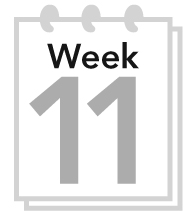
We continue our look at handling special occasions this week. We’ll also review your progress, examine additional food label traps, and discuss how a good night’s sleep can help you manage both your weight and your diabetes.
Whether it’s a holiday, a birthday, or simply a bunch of friends enjoying the night together, parties have a way of weakening one’s resolve. Some people avoid all parties, restaurants, and other situations that might cause them to overeat. While it’s understandable to want to avoid temptation, it’s not very realistic. It’s far better to learn to deal with the situation, because it will come up again and again and again. Remember, we’re working on building skills and strategies instead of relying on willpower. You can improve your chances of success in these situations by planning for them.
Party Strategies
Some of the following strategies have already been discussed in other sections of the book, but good ideas are worth repeating.
• Before you even head out the door for the party, decide what tradeoffs you will make. You can eat whatever you want, but you cannot eat everything you want or as much as you want. You might be tempted by drinks before dinner and drinks during dinner, appetizers, bread, fried foods, dessert, or any number of things. Don’t wait for the enticing aromas to decide for you. Before you get to the party, make a firm decision about what you will and will not eat. If you really want birthday cake, either satisfy yourself with just a bite or two or skip the bread, pasta, and other sweet and starchy foods.
• Don’t save up from breakfast and lunch to splurge at the party. Your friends without diabetes may be able to get away with this, but you cannot. The amount and type of food you eat at each snack and meal affects your blood glucose after eating. If you skimp early in the day and take certain diabetes medications, you risk having low blood glucose. If you overindulge after skipping meals, you risk high blood glucose.
• Control your hunger (and your blood glucose) before the party. If the event is late or if you’ll be eating dinner later than usual, have a snack before you go. A large glass of vegetable juice is very filling (only 70 calories and 15 grams of carbohydrate). Add some reduced-fat cheese to make your snack more substantial. You might also try a small apple with a tablespoon of peanut butter or dip some veggies and a few crackers into hummus. Eat just enough to take the edge off your appetite and keep your blood glucose steady.
• Dance the night away. Be as active as possible before, during, and after the party. If you have just a few minutes to exercise, take a walk after eating. Researchers from Old Dominion University in Virginia found that walking for 20 minutes shortly after dinner lowered after-meal blood glucose more than a walk before eating.
• If the food is served in a buffet, look over everything that’s offered before selecting anything. Be very picky, and choose only one or two small splurges. Make your meal nutrient-dense and moderate in calories, carbohydrate, and saturated fat.
• Start the evening with a low-calorie, non-alcoholic beverage, such as sparkling water or diet soda, and with filling, low-calorie food, such as steamed shrimp and raw vegetables.
• Bring food to share, such as a vegetable tray or exotic fruit like figs and persimmons or strawberries dipped in chocolate.
• When you’ve had enough to eat, position yourself far from the food and hold something in your hand, so you don’t idly reach for food. If you usually have a shoulder bag, for example, carry a clutch to the party to keep your hands occupied.
• Keep yourself occupied with conversation and other non-food activities.
• Wear something that makes you look fabulous or something just a tad tight in the waist. Either will remind you to keep tabs on your intake.
You’ve heard this many times before, but it’s worth saying again because it is so, so important. Progress is much more than your weight or your dress size or your belt size. Look back at your early food and activity records. Think about your habits and even the way you thought about food and diet before you started this program more than two months ago. The number of changes you’ve made will probably surprise you. Use the Progress Report in the Appendix to list your accomplishments. Include all medical improvements, like better glucose control and lower cholesterol, and every lifestyle change, like eating breakfast and taking the stairs at work. List positive changes in attitude and how you feel throughout your day. Ask close friends and family members what changes they have noticed. People close to you are likely aware of things that you haven’t noticed. Take pride in each triumph, no matter how big or small. Add to this list often, and refer to it whenever you need a boost in motivation.
No doubt you’ve noticed a slew of sugar-free breads, cakes, pies, and candies in the supermarket. Some of these products have misleading labels. Remember that calories are the key to managing your weight, as carbohydrates are to your blood glucose. A sugar-free cookie, for example, may or may not be lower in calories or carbohydrates than the regular version of the food. Even if a cookie has no sugar, there are still carbohydrates from the flour. Sugar alcohols (which are carbohydrates), such as sorbitol and xylitol, may also be used to make the cookie sweet. These will affect blood glucose, although not as much as regular sugar. You will have to measure your blood glucose before and after eating them to see how a product with sugar alcohols (or any food) affects you. Just as you have learned in previous lessons, check the Nutrition Facts panel for the serving size, the calories, and total carbohydrates.
Just one more caution about sugar-free desserts: many, especially sugar-free ice creams, are very high in saturated fat, with as much as 5 grams of saturated fat per half cup. Because saturated fat affects your LDL cholesterol levels, eating products that are high in saturated fat is unwise, no matter how low they are in calories and carbohydrates.
Which is most important: exercise, diet, or sleep? It’s a trick question! None of the three is optional. When it comes to your health and well-being, all three are critical. In our “go, go, go” society, where we all have too much to do and too little time in which to do it, it’s easy to sacrifice one or more of the three. For many, the first to go is sleep. Sleeping too little, however, affects hormone levels, impairs learning and memory, increases your risk of infection, and may even contribute to obesity, heart disease, and diabetes.
Research shows that individuals who sleep five or fewer hours each day, including naps, are twice as likely to have cardiovascular disease as those who sleep seven hours per day. Even one night of bad sleep affects blood glucose. Researchers in the Netherlands found that restricting sleep to four hours decreased insulin sensitivity by 20–25% compared with sleeping 8½ hours. Other research shows that sleep-deprived individuals snack more frequently and on more carbohydrate-rich foods. So you see, sleep really isn’t optional if you want to control your weight and your overall health.
If good sleep seems like just a sweet dream, making a few simple changes may offer relief.
• Schedule a bedtime and do your best to stick with it.
• Relax prior to bedtime. Make it a ritual. Enjoy a cup of decaf or herbal tea, take a relaxing bath, read a book, listen to soothing music, meditate, or practice yoga. Avoid vigorous exercise and disturbing books, magazines, and television shows.
• Avoid caffeine, alcohol, and large meals several hours before bed.
• If frequent urination from high blood glucose is keeping you awake, call your doctor’s office to see what changes you should make. If low blood glucose wakes you up, speak to your doctor immediately.
• If you are sleeping through the night but find yourself feeling tired in the morning, you could have a condition called sleep apnea. Sleep apnea is characterized by periods of irregular breathing while sleeping and is common in people with diabetes. Talk to your doctor if you have trouble feeling well rested after sleep.
 Last year, when I would mow our hilly, landscaped lawn, I had to do the 3 ½-hour job over two days. That’s when I was 70 pounds heavier. Today I worked all morning on the school landscaping. Then, I came home to mow the lawn and completed it all in three hours. Afterward, I felt great! Losing weight has changed my health and changed my life.
Last year, when I would mow our hilly, landscaped lawn, I had to do the 3 ½-hour job over two days. That’s when I was 70 pounds heavier. Today I worked all morning on the school landscaping. Then, I came home to mow the lawn and completed it all in three hours. Afterward, I felt great! Losing weight has changed my health and changed my life. Continue the following goals: _____________________________________________________________
Continue the following goals: _____________________________________________________________